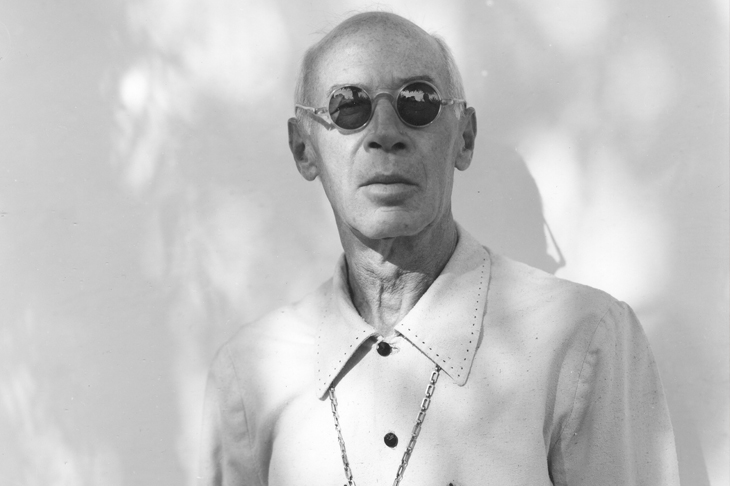Few writers seem less deserving of resuscitation than Henry Miller. When the Scottish poet and novelist John Burnside was asked to contribute the latest volume of Princeton’s ‘Writers on Writers’ series, he planned to choose Marianne Moore, a clearer influence on his poetry. Miller was too messy. A non-conformist and autodidact, his most famous novel, Tropic of Cancer, opened the door to literary obscenity, and also gave him the reputation of a pornographer. Burnside admits that he wrote the book less from a conscious decision than ‘out of need’.
To his credit, he does not skirt Miller’s notoriety, nor does he deny that much of his subject’s erotic writing is ‘embarrassing’. He does, however, announce that he will focus not on the ‘sex maverick’, but introduce in due course the ‘unhappy son’, the ‘dignified old man’, and most importantly, the ‘voyant’. To appreciate Miller is not to read him selectively but to understand why a writer who championed self-liberation could have made the mistake of equating it with the degradation of women.
Grounding Miller’s early books in the context of Teddy Roosevelt’s cult of masculinity and the soft pornography of writers such as Frank Harris (a frequent patron of Miller’s father, ‘a feckless tailor with a fondness for alcohol’), Burnside examines the codes of ‘manliness’ which dominated Miller’s Brooklyn childhood. None of this is to excuse Miller, but to shine a light on how his principles of artistic freedom — ‘first person, uncensored, formless — fuck everything!’ — never liberated him from viewing sexuality as inextricably bound to competition and hyperbole.
Burnside is least convincing when he argues that Miller is a ‘product of his time’, and most when he elucidates the combination of insecurity and overcompensation which permeated his life. Anaïs Nin, Miller’s patroness and lover, once told him:
In Tropic of Cancer, you were only a sex and a stomach. In Black Spring, you begin to have eyes, a heart, ears, hands. By and by, with each book, you will create a complete man, and then you will be able to write about woman.
It’s important to note that when Miller did try writing smut for money, his work was rejected for being insufficiently salacious.
Burnside saves his best readings not for defending Miller from familiar charges, however, but for presenting a new side of the writer through ecocriticism. The important books here are The Air-Conditioned Nightmare and The Colossus of Maroussi, the under-read travel books set in the United States and Greece. Miller ‘could be a master nature writer’, says Burnside, construing his environmentalism as part of the radical tradition of American ‘seers and prophets’ like Henry David Thoreau and Rachel Carson.
The sources in this book are wide-ranging and often a delight to encounter. Burnside’s mastery of Miller’s primary influences — Walt Whitman, Arthur Rimbaud and the Dao De Jing — place him squarely as a disciple of Miller’s anarchic spiritualism, rather than of his cheap eroticism. Even when Burnside’s sources verge on the tenuous, for example his extended treatment of the obscure French surgeon Henri Laborit, they are never boring.
At the beginning of his book, Burnside says that he wants to emulate, above all, Miller’s ‘drunkenness’. His prose resembles more often a pleasantly tipsy dinner partner, but he achieves a good glass-smashing, table-standing tirade in rare moments:
We want tradition, we get convention; we want sex, we get porn; we want love, we get valentines; we want honour, we get compromise; we want rituals, we get Paroxetine.
Any contemporary appraisal of Miller must answer the question of whether an intelligent, compassionate reader can conceivably take the best of Miller — his anarchist sensibility, his feeling for the natural world, his literary transgression — while leaving the rest behind. By using his own commendable self as an example, Burnside opens up new avenues of appreciation for us all.






Comments